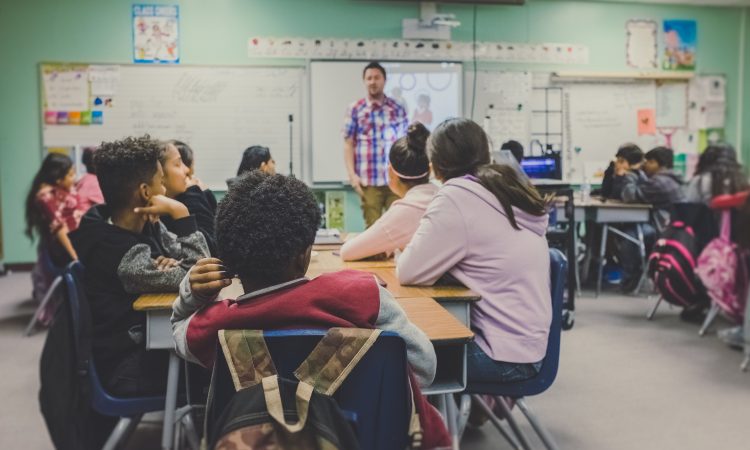With the right supports, career exploration can begin at any age. From videos to workbooks to journalling exercises, these resources can help school counsellors, educators, parents and other caring adults engage elementary school students in career exploration.
Activities, books, programs and tools
All About Me – myBlueprint
All About Me grants children from kindergarten to Grade 6 access to a variety of tools that introduce them to the world of work. Journals, media and reflections allow students to showcase their learning on their terms with built-in drawing tools, video/audio recordings, emotions, and a whole lot more.
Boys & Girls Clubs of Canada – Learning & Career Development
These programs give young people opportunities to strengthen and acquire new skills, test their abilities and enhance career readiness. Programs for children include Discovery Lab, a program that connects science to real-world contexts, and Kid Tech Nation, which teaches children digital skills, coding concepts, internet safety and computational thinking.
Career and College Readiness Counseling in P-12 Schools
This text is written to help school counselors conceptualize the career and college readiness needs of diverse P-12 students and design culturally relevant interventions. The focus is on helping readers to translate theoretical knowledge into practice.
Career curriculums by province and territories (CareerWise)
Career education across Canada varies based on provinces and territories. While curriculums differ in structure, they are all designed to help youth find success. Here is a breakdown of curriculum information for elementary and high school cohorts.
Career Development Elementary: Curriculum Guide (2017) (Government of Newfoundland and Labrador)
This 100+ page document offers a detailed at building an elementary school curriculum for career development, including activities and assessment tools. It also outlines curriculum outcomes.
Career Exploration in the Middle Grades: A Playbook for Educators (Association for Middle Level Education)
This Playbook – which has a PDF available for free download – aims to provide educators with a roadmap for creating effective career exploration programming. It includes implementation guides, case studies and program sustainability resources.
Career Education Resources (CareerEd)
Resources include a Career Education Guide: (Kindergarten to Grade 7), Career Education Guide CLE and CLC and Career Education Guide 8-9.
Careers Are Everywhere! Activity Workbook (Texas Workforce Commission)
This workbook introduces students to the concept of self-knowledge, helping them to explore how their interests and skills connect to a variety of career clusters. It appears to be geared toward elementary students.
CareerGirls
CareerGirls.org is a free, video-based career-exploration tool for girls. It has a collection of 10,000 career guidance videos focusing on diverse and accomplished women, including many who work in STEM fields. The website also offers a career quiz and a space to explore career clusters.
CareerKids
This website features numerous collections of paid resources that educators, guidance counsellors and parents can use with students and youth to help them learn about career development. For instance, the “Career Exploration” collection includes books, DVDs and a game to guide children through career exploration.
Career Work in Action: Discussions and Activities for Professionals – Youth (CERIC)
This resource aims to help professionals who deliver career supports apply CERIC’s Guiding Principles of Career Development in meaningful ways with youth. Part of a series of six resources – each focused on different demographics – the youth edition offers starter questions, practical interventions and fun exercises to apply.
CAREERinsite: A Guide for Career Counsellors and Educators (Alis)
CAREERinsite is a comprehensive career planning resource. It is intended to help students and clients of almost all ages and backgrounds. While some sections might be better suited to students in high school or above, educators in K-12 might find it to be a useful resource to support career education.
K-12 Career Exploration Lessons (Mississippi Department of Education)
A series of lesson plans for each grade from K-12 to help schools establish a career education program.
LEAP Into Careers! (4-H)
An activity book for facilitators to help students in Grades 3-5 understand careers. It is based on the four-part LEAP curriculum: 1. Youth discover and work with 12 foundational skills; 2. Youth learn about entrepreneurship; 3. Youth delve into the career fields; and 4. Youth design their own Learning Experiences Action Plan (LEAP).
The Early Years: Career Development for Young Children – A Guide for Educators and A Guide for Parents/Guardians (CERIC)
Based on CERIC-funded research conducted by Memorial University’s Dr. Mildred Cahill and Dr. Edith Furey, these guides explore the influence that educators and parents/guardians have on the career development process of children ages 3 to 8. The guides provide practical tips, activities and examples to help children develop a healthy sense of self in the early years and enable them to reach their full potential.
Xello
Xello is a digital platform that helps students discover the pathway that’s right for them using an investigative, discovery-based learning process. Students can identify their interests, skills, favourite career clusters, personality style and much more. They can save careers, schools, programs and experiences to form a visual roadmap that’s easy to update and share.
8 interactive activities for career learning with kids and youth (CareerWise)
Career and educational professionals can use apps, virtual and in-class games to introduce younger kids and high school students with career exploration. Here are eight interactive activities that offer an engaging and meaningful experience.
Professional development
Guidance and Career Education Part 1 (University of Toronto)
Guidance and Career Education Part 1 is a foundational course, designed for both the classroom teacher and for the educator who is interested in pursuing a Guidance role in their school board. It is available as an online course.
Micro-credential Series for Career Educators (Life Strategies)
In fall 2023, Life Strategies will also be offering a series of courses that aim to equip educators with knowledge and skills to support students in their career development process:
- Fundamentals of Career Development
- Career Development and Mental Health Connections
- Teaching Career Curricula in Canadian Schools
Articles
Careering magazine
- Applying universal design as a pathway to inclusive career education – by Tricia Berry
- Career development will help equip children to take on climate change – by Stefania Maggi
- Community connections foster k–12 career exploration – by Heather McIntyre and Sean Jones
- Current approaches to career education risk impeding students’ exploration – by Josslyn Gabriel
- K-12 career readiness needs to go beyond the vision of school leaders – by Maria Vitoratos
- Making career development ‘stick’ in K-12 – by Adriano Magnifico
- Principles in Action: Elementary career education equips students to navigate complex world of work – by Ed Hidalgo
- We need to start early: Fostering a career mindset in young people – by Lucy Sattler
- ‘When I grow up’: How an outdated career question cultivates unhelpful mindsets – by Fanie Zis
CareerWise
- Bringing teachers into the career conversation – by Lucy Sattler
- Career education needs to start earlier than you think – by Jena Tarabad
- Career options and aspirations: A K-12 education approach – by Allisson Badger
- Connecting educators to industry to improve youth career literacy – by Megan Piercey Monafu
- Ed Hidalgo: ‘Every child should know there’s a place in the world for them’ – by Ed Hidalgo
- How to get girls interested in entrepreneurship – by Katharine Cornfield
- Relationships the key to creating a school career development model – by Ed Hidalgo
- Resources to support career literacy conversations – by Lindsay Purchase
- 5 podcasts to help kids start learning about careers – by Lindsay Purchase
- 5 resources to help parents support their children’s career development – by Lindsay Purchase
- 5 ways to talk with young children about work and careers – by Kimberly A.S. Howard and Stephanie M. Dinius
Additional reading
- ‘Academic Career Plans’ Have Students Exploring Careers as Early as Kindergarten (The74)
- A Process for Guiding Middle School Students Through Career Exploration (NCDA)
- Bringing All Students Inside the Circle: DEI and Career Development in K-12 Schools (NCDA)
- Bringing Careers into the Curriculum (CDAA)
- Career and life planning in schools (People for Education)
- Career education in Alberta : Career Education Task Force – Final report (Government of Alberta)
- Career Education in Primary School (CDAA)
- Can Minecraft really help you build a career? (BBC)
- Career ambitions ‘already limited by age of seven’ (BBC)
- Career exploration curriculum for elementary school-age kids (Michigan State University)
- Career Exploration for Elementary Students: Considering it for your Classroom? (Xello)
- Collaboration between Teachers and Career Specialists in Middle School (NCDA)
- Early in the Story: Career Curriculum in Elementary Schools (NCDA)
- How can we foster lifelong learning attitudes in students? (OECD)
- Starting early – the importance of career-related learning in primary school (Education and Employers)
- Supporting Early Career Development of Transgender and Gender Expansive Children in Elementary School (NCDA)
- The World Of Work – In Elementary School (Forbes)
- Why Career Exploration Matters for Middle School Students (NCDA)
Research
Note that some of the following may require a log-in or request for access to download.
Career Development in Children: Identifying Critical Success Conditions and Strategies (CERIC)
This-CERIC funded research project is being undertaken by an international project team lead by Dr. Lorraine Godden (Ironwood Consulting and Carleton University). It aims to shed light on how foundational concepts and skills, introduced and developed by classroom teachers, intersect with career development and manifest into career-related learning in Canadian elementary schools. The project is in progress and has produced three reports to date:
- Supporting Career Development in Children: A Literature Review
- Supporting Career Development in Children: Curriculum and Policy Review
- Supporting Career Development in Children: A Review of Business and Industry Partnerships
CERIC literature searches
- Early intervention career development for children and adolescents: Topics explored include career exploration, family and parental influence, school/guidance counsellors, and race and gender.
- Parental involvement in career development: Topics explored include gender stereotyping, self-employed parents and adolescent personality development.
- Infusing career development into K-12 curriculum: Topics explored include career exploration and guidance for elementary students, parental involvement in student career planning, benefits of career counselling programs for students and K-12 career competency building and implications.
Social-emotional learning and career development in elementary settings (British Journal of Guidance and Counselling)
A holistic approach to youth development suggests that, given the interconnected nature of development in the domains of career development and social-emotional-learning (SEL), children and youth are better supported when education in both domains is provided in an integrated way. This paper integrates a model of SEL with models of childhood career development competencies and career-related reasoning.
What works? Career-related learning in primary schools (Education and Employers Research and The Careers & Enterprise Company)
This paper provides evidence of the benefits of career-related learning (CRL) for children in primary school, as well as on the effects of CRL on primary-aged children’s decisions, aspirations and attitudes. It maps key actions being taken by primary schools to support children’s transitions to secondary school and beyond.
Did we miss something? Leave a comment below or send us a note at careerwise@ceric.ca if you have information that can help make our article even better.









The Careers are Everywhere workbook link is actually for a much older version of that document. Please use the following link to get to the current edition. https://lmci.state.tx.us/shared/PDFs/Careers_Are_Everywhere.pdf
[…] Tools and resources for career exploration with elementary students (CareerWise) […]
[…] Purchase, Lindsay. (2023). Careerwise. Tools and resources for career exploration with elementary students. https://careerwise.ceric.ca/2023/08/24/career-exploration-elementary-students/. […]